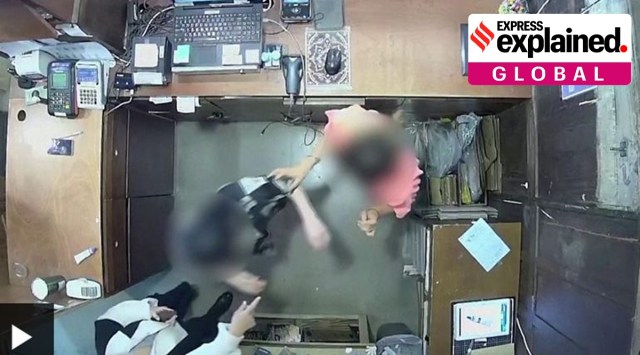- India
- International
Explained: The diplomatic immunity row sparked by Belgian envoy’s wife ‘hitting’ two in Seoul
The incident has led to a debate over the extent of protection enjoyed by diplomats and their family members.
 A CCTV grab of the incident purportedly involving envoy Peter Lescouhier's wife, Xiang Xueqi.
A CCTV grab of the incident purportedly involving envoy Peter Lescouhier's wife, Xiang Xueqi. After she allegedly hit two staff members at a boutique in Seoul last month, the wife of Belgium’s ambassador to South Korea will now be exercising her diplomatic immunity to avoid criminal charges, police said on Monday.
The envoy, Peter Lescouhier, has said previously that he “sincerely regrets the incident involving his wife”, and that he “wants to apologise on her behalf”.
The woman had been questioned by the police earlier this month after the Belgian embassy said she would cooperate with the investigation. Now, however, the embassy “has expressed it would maintain the right of immunity for the ambassador’s wife”, according to an AFP report.
The incident has since sparked anger in South Korea, with debates rife over the extent of protection enjoyed by diplomats and their family members.
What is the controversy involving the Belgian envoy’s wife?
Reports said that the Belgian ambassador’s wife, 63-year-old Xiang Xueqi, was trying on clothes at a boutique in Seoul before walking out, prompting a staff member to come running after her to check an item she was wearing.

The shoplifting concern led to a confrontation after Xiang followed the employee back to the store. CCTV footage showed her pulling at the arm of one staff member and hitting her on the head, and then was seen pushing and slapping across the face another employee who tried to intervene.
As per the AFP report, the video was released by the family of an alleged victim, after which it was widely reported by the local media, drawing criticism of the ambassador’s family.
Newsletter | Click to get the day’s best explainers in your inbox
The Belgian embassy in South Korea tried to mitigate the scandal by issuing a bilingual apology by the ambassador on Facebook, but matters became worse after the tone of the Korean version was seen as heavy-handed.
Many on South Korean social media have since questioned the privileges extended to the family members of diplomats, and why criminal laws of the land should not apply to them.
What is diplomatic immunity?
It is a privilege of exemption from certain laws and taxes granted to diplomats by the country in which they are posted. The custom was formed so that diplomats can function without fear, threat or intimidation from the host country.
Diplomatic immunity is granted on the basis of two conventions, popularly called the Vienna Conventions — the Convention on Diplomatic Relations, 1961, and the Convention on Consular Relations, 1963. They have been ratified by 187 countries, including South Korea. Which means, it is a law under that country’s legal framework and cannot be violated.
What is the extent of this immunity?
According to the Vienna Convention on Diplomatic Relations, 1961, the immunity enjoyed by a diplomat posted in the embassy is “inviolable”. The diplomat cannot be arrested or detained and his house will have the same inviolability and protection as the embassy.
It is possible for the diplomat’s home country to waive immunity but this can happen only when the individual has committed a ‘serious crime’, unconnected with their diplomatic role or has witnessed such a crime. Alternatively, the home country may prosecute the individual.
While diplomatic immunity is intended to “insulate” diplomats from harm, it does not insulate their countries from a bad reputation and a blow to bilateral ties. The privilege of diplomatic immunity is not for an individual’s benefit. If a diplomat acts outside his business of conducting international relations, a question arises over whether his immunity still applies.
Is this immunity the same for all diplomats and their families?
No. The Vienna Convention classifies diplomats according to their posting in the embassy, consular or international organisations such as the UN.
A nation has only one embassy per foreign country, usually in the capital, but may have multiple consulate offices, generally in locations where many of its citizens live or visit. Diplomats posted in an embassy get immunity, along with his or her family members. While diplomats posted in consulates also get immunity, they can be prosecuted in case of serious crimes, that is, when a warrant is issued. Besides, their families don’t share that immunity.
Xiang, being the Belgian ambassador’s wife, thus enjoys diplomatic immunity.
Have instances of immunity abuse arisen in the past?
In 1967, the Burmese ambassador to Sri Lanka shot his wife whom he suspected of having an affair. The next morning, he built a pyre on the back lawn of his house and set the body on fire. The ambassador reportedly told the Sri Lankan police that his house was Burmese territory. Police could do nothing, because the ambassador enjoyed diplomatic immunity. However, he was later recalled.
In 1981, the son of a Ghanaian diplomat to the UN was identified as the perpetrator of at least two — and possibly 15 — rapes and robberies in New York. But he never faced charges because he, as a family member, enjoyed diplomatic immunity.
In 1983, a Saudi Arabian diplomat’s son raped a 16-year-old in the US. He could not be charged because of diplomatic immunity, and was said to have voluntarily left the US. However, some months later, the girl encountered the accused at her workplace. The Saudi embassy claimed to the US State Department that the victim had actually seen the brother of the accused, and continued to insist that the accused had left the US. It was only after a private investigator photographed the alleged rapist that he finally left the US.
In April 2012, in Manila, Panamanian diplomat Erick Bairnals Shcks was accused of raping a 19-year-old Filipino woman, but was released from detention because he enjoyed diplomatic immunity.
In 1987, a delegate from Barbados to the UN sought to extend diplomatic immunity to his dog after it bit several neighbours in Pelham, New York, and warned of “possible international consequences” if any action was taken against the German Shepherd.
More Explained
EXPRESS OPINION
Apr 26: Latest News
- 01
- 02
- 03
- 04
- 05









































